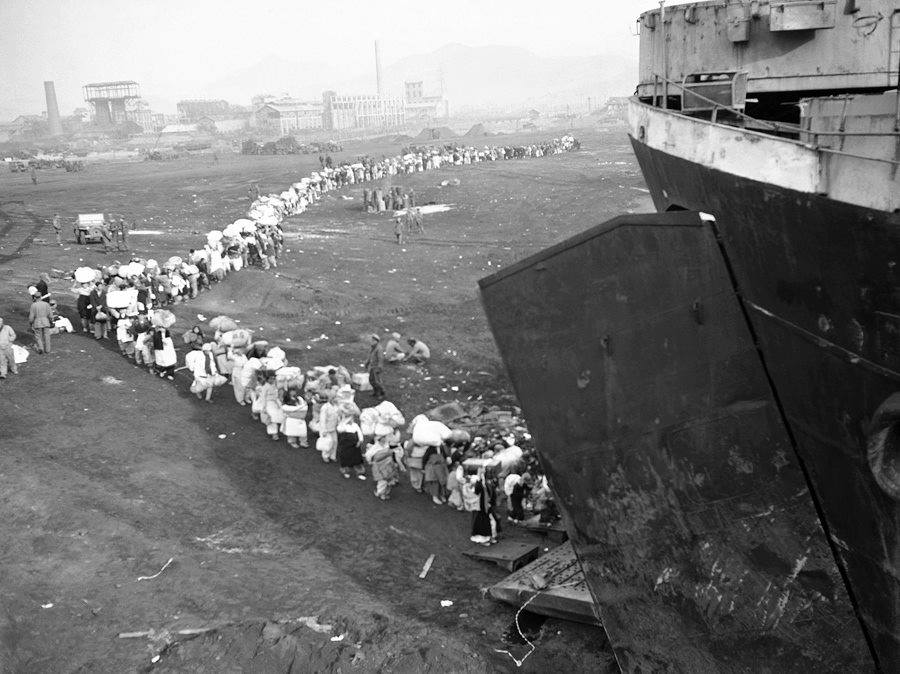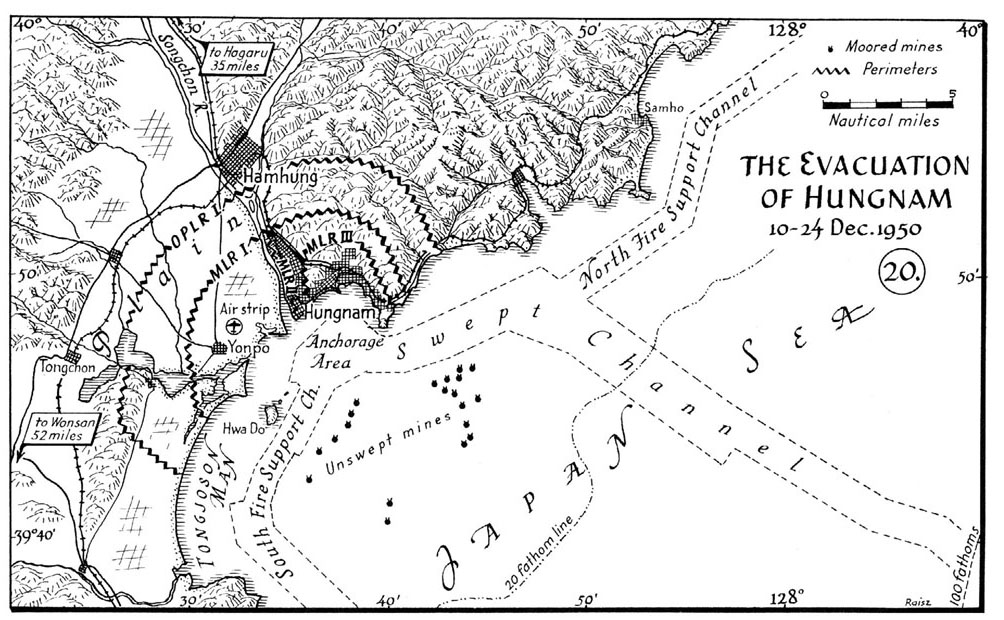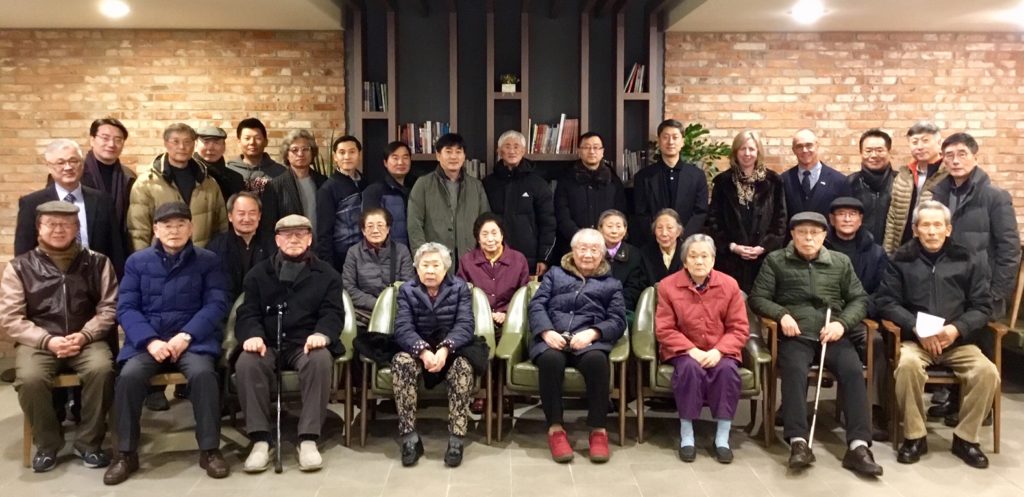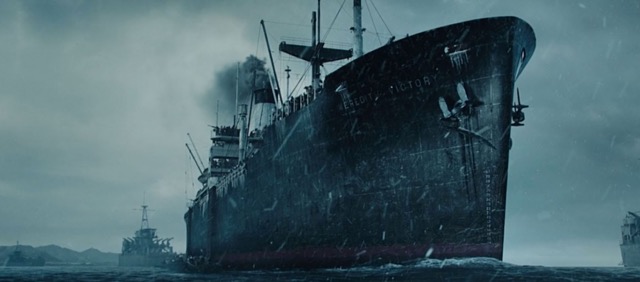A Christmas Miracle

Thousands of refugees, huddled at the water’s edge and anxiously waiting to board American ships, knew what would happen if they were left behind. The Chinese, massing in the nearby mountains, would storm into Hungnam and make an example of anyone who had defied them.
US and ROK collaborators, Christians, anti-communists, and anyone deemed a “sympathizer” would be rounded up, interrogated, and punished. Many would be shot. Others would be sent to gulags or work camps where they would spend the rest of their lives as prisoners of the communist regime. Some would simply disappear.
The only hope for the North Korean civilians at Hungnam was the US military.
Attacking In Another Direction
With Chosin, the most epic battle of the Korean War, coming to a dramatic conclusion in the early days of December 1950, the men of 1st Marine Division and thousands of soldiers, sailors, and airmen, found themselves trapped at Hungnam, a port on the east coast of North Korea.
Having fought their way 70 miles through knee-deep snow, fierce winds, and sub-zero temperatures, the Americans, cold, hungry, and exhausted, had only one way out: the sea.
On December 10 they began boarding US Navy and Merchant Marine ships for their withdrawal to the South. Taking all their weapons, ammunition, vehicles, and supplies with them, they would soon be ready to fight again.
But that’s only half the story. In the final days of the historic evacuation, a dramatic and unprecedented event occurred, one that is now referred to as a “Christmas Miracle.”

Marines depart Hungnam, December 1950. (Photo credit: David Douglas Duncan)
The Refugees
Tens of thousands of North Korean civilians, hoping to escape from the approaching Chinese army, were also at Hungnam. Hearing rumors that the retreating Americans were allowing small groups of refugees to board ships, they had trekked through mountain passes, snowdrifts, roadblocks, and enemy troop formations to reach the port.
With bags, sacks, crates, and in some cases, babies, strapped to their backs, mothers, fathers, sons, daughters, and everyday citizens from villages and towns across the region had said goodbye to families and friends and promised to return in a few days.
Despite the journey's constant dangers, it was worth it. They had lived under communism for five long years, and many wanted no part in China’s takeover of their country or Kim Il-sung’s regime.

North Korean civilians making their way towards Hungnam. (public domain)
An Unprecedented Humanitarian Operation
Waiting on the frozen beaches and docks of Hungnam, the refugees hoped and prayed for safe passage to the South. Hyun Bong-hak, a Korean doctor working for the US Army as an interpreter, would help make that happen. Repeatedly advocating for his fellow countrymen, he eventually persuaded the top brass to take the stranded civilians.
With US Navy battleship Missouri and destroyers and cruisers pounding the surrounding mountains and US Marine and Navy fighter planes constantly dropping bombs, the Chinese were kept at bay. There was still time to save the refugees.

The USS Missouri firing her 16’ guns into the mountains around Hungnam. (Photo credit: US Navy)
Marine Colonel Edward H. Forney, the evacuation control officer, and US Navy Admiral James Doyle, the top Navy commander at Hungnam, went into action. With their teams of naval and amphibious experts, the two men worked around the clock to ensure the refugees were loaded as quickly and efficiently as possible.
In a remarkable testament to American ingenuity, teamwork, and dedication, by December 24, the final day of the operation, 100,000 refugees had been rescued.
The Greatest Rescue By A Single Ship
Of the many ships that participated in the evacuation, SS Meredith Victory, a Merchant Marine cargo ship designed to carry only a handful of passengers, loaded 14,000 refugees into her cargo holds. Her record-breaking voyage to Geoje-do, an island off the southern coast of Korea, became the “greatest rescue operation by a single ship in the history of mankind.” One of the ship’s officers later said, “We were just young men doing our jobs.”

Refugees on Meredith Victory’s weather deck, December 1950. (Photo credit: Bob Lunney)
The Best Christmas Present
On Christmas Eve, the last day of the Chosin-Hungnam saga, the lead story in The New York Times read:
Evacuation of Hungnam Completed . . . UN Fleet Brings Out 105,000 Soldiers and 100,000 Refugees
The largest amphibious withdrawal of the Korean War, and the greatest military evacuation of civilians, under combat conditions, in US history, was over.
President Harry Truman was ecstatic. “I thank God for the success of the Hungnam operation. It is the best Christmas present I’ve ever had,” he proclaimed after receiving a 1 a.m. Christmas call from Omar Bradley, the Chairman of the Joint Chiefs of Staff.
Remarkably, there are an estimated one million descendants of those rescued at Hungnam who now live in freedom in South Korea, the United States and other countries around the world.
To this day, the refugees continue to express their appreciation. As Mr. Sohn Yang-Young (aka: Kimchi 1) said recently:
All these years I’ve been telling my children to think about the life I’ve lived and what it was like to be a refugee. I also tell them to think about how the Americans came to a strange land, gave their lives, and rescued so many people . . . we should not forget the sacrifices of the young soldiers. Their lives were just as precious as ours.
Postscript
This Thursday, December 20, from 8-10pm, NBC will be airing the finale of “Timeless,” a science fiction time travel drama series. In the second half of the two-part episode, the series’ stars will travel back in time to the Hungnam Evacuation.
The episode, entitled “The Miracle of Christmas,” will be the last hoorah for the “Timeless" team, which had a loyal following of millions during its two-season run.
Thank you to the “Timeless” team for choosing to share the dramatic story of the Hungnam Evacuation with millions of viewers this Thursday.
Enjoy the show!

Top/Feature photo: Refugees loading at Hungnam. (Photo credit: US Navy)


A Great Article.
I am also a writer. I too wrote about Meredith Victory, which was published by the Graybeards, National Korean War Veterans Magazine in Washington, D.C. in 2019. Below is an excerpt:.
“…On Christmas Day, 1950, the 455 foot Meredith Victory operated by Moore- McCromack Lines… Captain Leonard LaRue at the helm, was carrying supplies to American servicemen in Korea on behalf of the Navy. Three days earlier, on December 22th, Meredith Victory, along with 200 other American ships, was summoned to the North Korean seaport of Hungnam to evacuate American and South Korean Marines as well as more than 90,000 North Korean civilians waiting to escape the communist state. Captain LaRue, a Philadelphia native and a World War II veteran, saw refugees thronging the decks, carrying their household items and children, in their flight from the Communists. He ordered his crew of 47 men to help them, and soon 14,000 men, women, and children crammed into the five cargo hold, in addition to covering the entire Main Deck of the freighter that was designed to hold only sixty persons…
In the ship-log, Captain LaRue had written these words: “The nearness of Christmas carries my thoughts to the Holy Family—how cold they would have been, without a shelter. Amazingly, not a single person died and five babies were born during this amazing journey…”
I’m honored to write a few words on your page here. Therese Park
Thank you so much for sharing this, Therese. It’s terrific seeing Capt. LaRue getting the recognition he deserves, and we’re so grateful to see your heartfelt message.
I’d love to read your entire article and share it on my website if you wouldn’t mind sending it to me.
God bless and Merry Christmas to you and your family.
Request permission to post on our facebook/website. Plez advise.
In any case, Merry Christmas!
I’d be honored to have you share my blog in SOF and on your FB page. Please let me know when it comes out so I can share it.
Thank you for touching base and Merry Christmas!
Kim Jung Ya (Song) was 11-12 years old when she was evacuated by ship with her classmates and teachers from Hungnam without their families. Jung Ya debarked at Port Busan. At 18 she met a US Army service man and they were married when both were 21. She currently resides in Arizona with her veteran husband Robert Weinheimer.
Robert and Song (Jung Ya) are searching to retrace Song’s journey from Hungnam to Pusan. Song believes her ship first stopped at Inch’on before proceeding to Busan for debarkation. Song was eventually adopted by a Korean family. We married in 1959. We are both now 81 years of age and have been married for 60 years.
I recently purchased the book “Ship of Miracles” hoping to learn more on the subject and possibly she had been a refugee on board.
Robert Weinheimer
10-12-2019
Thanks so much for sharing this story, Robert! That’s pretty incredible.
Would really like to talk to both of you and learn more about Song’s journey and perhaps be of help to you as well.
You can email me at ned@nedforney.com.
I salute you for your service and appreciate your taking the time to write.
I am a former Marine Corpsman. I was transferred to 1st Marine division in 1954 and served in marine field hospital unit with Charlie med. Though we never saw battle we cared for marines and Korean citizens injured either by remaining land mines or other everyday hazards. Although I never served in battle conditions I have always been proud of my role as a corpsman and have enjoyed your beautifully done work on the “forgotten war”.
Thanks so much for your support and heartfelt comments. What you did after the war was so important in helping Korea recover.
I was in the Marine Corps infantry and served with many outstanding Corpsmen. As you know, the Marines love their Corspmen!
Appreciate your reading the blog and commenting, Paul.
Semper Fi!
[…] the mom and her family were delivered to safety via the Hungnam Evacuation (aka “The Miracle at Christmas”), the Time Team hid in a chapel, fearing the worst… until […]
hi I was there and evacuated at Hungnam I’m not sure which ship but it was big and there was a chow line all day and night 3 men to share a bunk I want to say the William Weigle but I’m not sure we walked and fought all the way from the tokton pass Edward s davis bloody George 3rd bn. 5th marines e mail dawnconnors68@yahoo.com thanks for remembering ned
Thanks so much for reading the blog and commenting, and thank you for your service to country and Corps.
What the 5th Marines did, and the entire 1st Marine Division, is truly remarkable. Semper Fi!
Nicely written Ned! As a former US Navy Hospital Corpsman, and later a US Navy Nurse, I spent a few years assigned to USMC units… I’m always proud to read pieces of the history of our Beloved Corps.
Thanks, Will, for reading and commenting, and thank you for your service to the Corps. When I was in the Marine Corps Infantry I had many great Corpsmen in my units.
Semper Fi!
My dad was on the uss reclaimer and was involved in the evacuation at Hungnam. He said they had a bunch of North Korean civilians on board.
I can’t imagine what your dad saw at Hungnam. I salute him for his service during the Korean War. I’d love to hear his thoughts or see any pictures he might have from Hungnam. The Navy played a critical role that so many people overlook.
Thanks for reading the story and commenting.
Great read Ned——thank you
Thanks, Pat. Appreciate your reading and commenting.
So glad I could pay tribute to you and all the men who served at Chosin and were evacuated at Hungnam. What you guys did will always be remembered and appreciated.